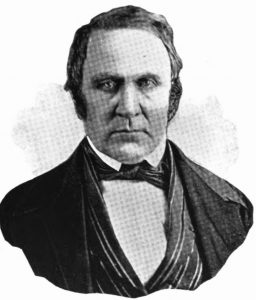
Photo info …
Credit: Public domain via Wikimedia CommonsView Source
(Feb. 23, 1796 – May 19, 1868). William W. Wick was born in Canonsburg, Washington County, Pennsylvania to minister William Wick Sr. and Elizabeth McFarland. Wick’s father moved the family to the Connecticut Western Reserve, the portion of land in what is today the northeastern region of Ohio, where he became the first minister.
After his father’s death in 1815, Wick moved to Cincinnati where he taught school and studied medicine until 1818. He moved to the new state of Indiana, studied law, and was admitted to the bar in 1819.
Wick’s early career focused more on politics than law. He served as clerk of the Indiana House of Representatives in 1820 and as assistant clerk for the Indiana State Senate a year later. Beginning in 1822, Wick began his long, though interrupted, work as a judge. From 1822 to 1825, Wick served as judge of the Indiana Fifth Judicial Court. He moved to Indianapolis in 1822 and in 1826 was named quartermaster general.
Wick served as Indiana’s secretary of state from 1825 to 1829. In this role, he also served as Indiana’s first state librarian. He returned to the Fifth Judicial Circuit as a prosecutor until 1831 and as president judge from 1834 to 1837. Notably, Wick presided over the trial, which marked the first recorded case of a white man sentenced to death for crimes against .
Wick served in the 26th, 29th, and 30th Congress from 1839 to 1841, 1845 to 1847, and 1847 to 1849, respectively. He returned to private law practice from 1841 to 1845 after his failed bid for reelection during the 27th Congress.
Wick’s opposition to efforts to limit slavery’s expansion surfaced during debates regarding U.S. territorial gains from the Republic of Mexico after the . Many historians view that war as one fought to gain territory for the expansion of slavery. During negotiations in 1846, David Wilmot of Pennsylvania suggested the prohibition of slavery or involuntary servitude except as sentenced for the conviction of a crime in any newly gained territory. Conversely, Wick proposed an amendment to extend the Missouri Compromise line of 36⁰ 30” to the Pacific Coast to permit slavery in territorial gains below that latitude, which was thought to be the natural limit for the growth of cotton. Though defeated, the proposal signified his attempt to eliminate the total restriction of slavery.
Wick vocally opposed the annexation of any Mexican territory, “I do not want any mixed races in our Union, nor men of any color except white, unless they be slaves. Certainly not as voters or legislators.” In his effort to rid the state of Indiana of its Black residents, he served as secretary of the Indiana Colonization Society. The organization helped in repatriation efforts of free Blacks to Liberia, a country it helped to establish.
Wick sat as a judge of the Circuit Court for the third time from 1850 to 1853. President Franklin Pierce appointed him postmaster of Indianapolis from 1853 to 1857. His fourth stint as a judge of the Circuit Court until 1859 gave him a total of 15 years on the bench. The following year he campaigned for Illinois U.S. Senator Stephen A. Douglas’ bid for the presidency.
After Douglas’ loss, Wick moved to Franklin, Indiana, where he lived until his death.

Help improve this entry
Contribute information, offer corrections, suggest images.
You can also recommend new entries related to this topic.

